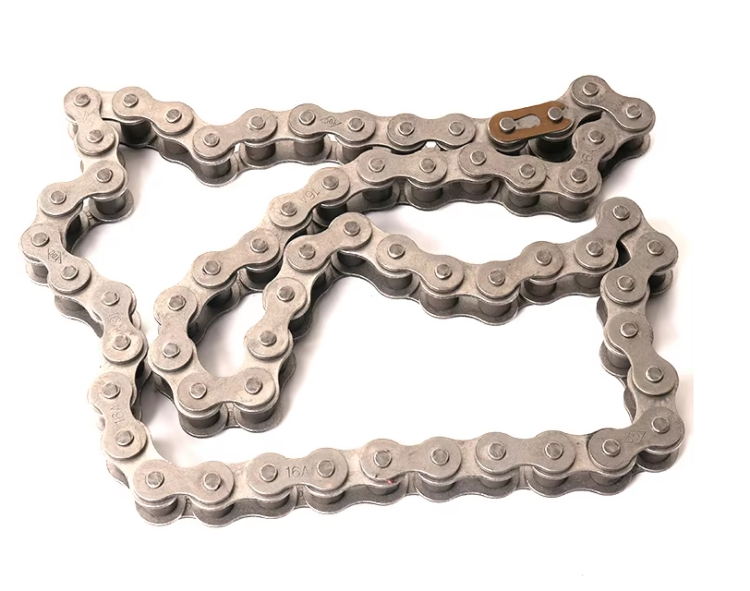Industrial Chain Roller Chain – High-Performance Power Transmission Solution for Heavy-Duty Applications Engineered for durability and precision, this industrial roller chain delivers reliable power transmission across demanding sectors such as automotive assembly, agricultural machinery, and automated manufacturing systems. Designed to handle high torque loads over extended distances without significant wear, it ensures consistent performance in environments where uptime and efficiency are critical. With a focus on longevity, smooth operation, and minimal maintenance, this chain is an essential component in modern industrial workflows. Key Features: - Precision-engineered links and rollers for reduced friction and enhanced load distribution - Heat-treated alloy steel construction for superior strength and resistance to fatigue - Corrosion-resistant coating options for use in humid or chemically exposed conditions - Compatible with standard sprocket sizes and widely adopted industry standards (e.g., ANSI B29.1) - Low noise operation due to optimized bushing and roller design Detailed Description: This industrial roller chain combines robust engineering with advanced materials to meet the rigorous demands of heavy-duty applications. Each link is meticulously crafted using hardened steel components that resist deformation under constant stress, making it ideal for continuous operation in production lines and field equipment. The roller system minimizes contact stress between pins and bushings, significantly extending service life while reducing energy loss. Whether used in conveyor systems, engine drive trains, or material transport mechanisms, this chain maintains precise synchronization and efficient motion transfer even at high speeds. Its modular design allows for easy installation, replacement, and integration into existing mechanical setups—reducing downtime and increasing overall productivity. Ideal Use Cases: In automotive manufacturing, these chains drive camshafts and crankshafts, enabling seamless engine function and optimal timing control. In agriculture, they power tractors, harvesters, and irrigation systems, ensuring reliable performance during peak seasons. In industrial automation, especially when paired with
wire mesh conveyor belts, they facilitate uninterrupted movement of goods along assembly lines. The open structure of the wire mesh enhances airflow and simplifies cleaning—making them perfect for food processing, pharmaceuticals, and heat treatment processes like drying, baking, or cooling. This versatility makes the chain suitable for both linear and curved conveyor configurations, offering flexibility in facility layout planning. Customer Testimonials: “After switching to this roller chain in our auto plant’s assembly line, we saw a 30% reduction in unexpected breakdowns. It runs quieter than our previous model and handles the daily workload without issues.” – Manufacturing Engineer, Germany “We use it in our grain harvesting equipment and it performs flawlessly even in dusty conditions. The corrosion protection really pays off in wet climates.” – Farm Equipment Manager, Canada “The combination with the
stainless steel mesh belt has transformed our food packaging line—it’s easier to clean, reduces contamination risks, and keeps the flow steady throughout the shift.” – Operations Supervisor, Australia Frequently Asked Questions: What makes this roller chain better than standard chains? It features heat-treated alloy steel, precision-machined rollers, and improved surface finishes that reduce wear and extend operational life compared to generic alternatives. Can it be used in high-temperature environments? Yes, with optional high-temperature coatings and compatible sprockets, it operates efficiently up to 300°C (572°F), making it suitable for ovens, dryers, and thermal processing units. Is it compatible with existing conveyor systems? Absolutely—it adheres to international standards like ANSI B29.1 and ISO 606, allowing direct replacement in most industrial conveyors without redesign. How often should I lubricate it? Lubrication intervals depend on usage intensity but typically range from every 500 to 2,000 operating hours. For continuous duty, automatic oiling systems are recommended. Does it require special tools for installation? No—standard chain tools and sprocket alignment methods apply. However, proper tensioning and tracking are crucial for maximizing lifespan and minimizing vibration.
Product Categories : Conveyor Chain


